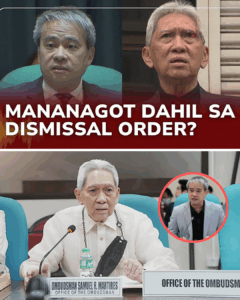THE SECRET DECISION THAT SHOOK THE PHILIPPINES: THE VILLANUEVA CASE

In a nation where transparency and accountability are paramount, the recent revelation of a secret decision by former Ombudsman Samuel Martires has ignited a firestorm of controversy. The case centers on Senator Joel Villanueva, who, in 2016, faced a dismissal order from the Ombudsman over alleged misuse of his Priority Development Assistance Fund (PDAF) during his tenure as a congressman. However, a 2019 reversal of this decision by Martires remained largely unknown to the public until October 2025, raising questions about the integrity of the justice system and the motivations behind such secrecy.
BACKGROUND OF THE VILLANUEVA CASE
In November 2016, then-Ombudsman Conchita Carpio-Morales issued a dismissal order against Villanueva, citing grave misconduct, serious dishonesty, and conduct prejudicial to the interest of the service. The charges stemmed from allegations that Villanueva misused P10 million from his PDAF, channeling it through non-governmental organizations for a ghost project. The Commission on Audit had previously disallowed the transaction, and the Ombudsman found that the supporting documents were fabricated, including liquidation reports and beneficiary lists.
Despite the severity of the allegations, Villanueva maintained his innocence, claiming that the incriminating documents were forged. The case led to criminal charges against him, including violations of the Anti-Graft and Corrupt Practices Act and malversation through falsification of public documents.
MARTIRES’ REVERSAL OF THE DECISION
In July 2019, Samuel Martires, who succeeded Carpio-Morales as Ombudsman, granted Villanueva’s motion for reconsideration, effectively reversing the 2016 dismissal order. This decision, however, was not made public at the time. It wasn’t until October 2025 that the existence of this reversal came to light, when Martires’ successor, Ombudsman Jesus Crispin Remulla, planned to communicate to the Senate urging them to implement the original 2016 decision. Remulla cited Martires’ “secret order” as the reason for halting his plan.
Villanueva, upon learning of the situation, presented documents dated September 10, 2025, from both the Sandiganbayan and the Office of the Ombudsman, confirming that he had no pending cases. He accused Remulla’s actions as “harassment,” asserting that the matter had been settled years ago.
LEGAL AND ETHICAL IMPLICATIONS
The revelation of Martires’ secret decision has raised significant legal and ethical concerns. Legal experts argue that if Martires ruled on the Villanueva case beyond a reasonable time, he could be held liable for delayed justice. The Supreme Court has emphasized the importance of timely decisions, and any undue delay could undermine public trust in the judicial system.
Ethically, the lack of transparency surrounding the reversal decision is troubling. Public officials are expected to uphold the highest standards of integrity, and secretive actions, especially in matters of public interest, can erode confidence in governmental institutions.
THE POLITICAL DIMENSIONS
The timing of the reversal and its subsequent concealment have also sparked political debates. Critics suggest that the decision may have been influenced by political considerations, aiming to protect an ally or to avoid controversy. The involvement of high-ranking officials and the lack of public awareness until recently point to possible political maneuvering behind the scenes.
Supporters of Villanueva argue that the case highlights systemic issues within the justice system, where powerful individuals can manipulate outcomes to their advantage. They call for greater oversight and reforms to ensure that justice is served impartially and transparently.
CALL FOR INVESTIGATION AND REFORM
In light of these developments, there have been calls for a thorough investigation into the circumstances surrounding Martires’ secret decision. Transparency advocates demand accountability from all parties involved, urging that such actions be scrutinized to prevent future occurrences.
Furthermore, there is a growing consensus on the need for judicial reforms to enhance transparency and efficiency. Implementing measures such as public access to decisions, strict timelines for rulings, and independent oversight could help restore public confidence in the justice system.
CONCLUSION
The Villanueva case serves as a stark reminder of the importance of transparency and accountability in public office. The secret reversal of a dismissal order raises serious questions about the integrity of the justice system and the motivations of those in power. As the nation grapples with these revelations, it is imperative that steps be taken to ensure that justice is not only done but is seen to be done. Only through transparency, accountability, and reform can the public’s trust in the justice system be restored.
News
Minsan, isang batang nakakita ng mali sa mundo ang nagkaroon ng kapangyarihang magligtas bago pa man malaman ng iba kung ano ang nangyayari.
“Minsan, isang batang nakakita ng mali sa mundo ang nagkaroon ng kapangyarihang magligtas bago pa man malaman ng iba kung…
Handa na ba ang inyong mga puso para sa isang kwentong magpapakita na hindi lahat ng kumikinang ay ginto
“Handa na ba ang inyong mga puso para sa isang kwentong magpapakita na hindi lahat ng kumikinang ay ginto?” May…
Minsan, isang simpleng tanong ang maaaring baguhin ang takbo ng isang araw… at buksan ang pintuan ng nakalimutang kasaysayan
“Minsan, isang simpleng tanong ang maaaring baguhin ang takbo ng isang araw… at buksan ang pintuan ng nakalimutang kasaysayan.” Lumakad…
Ilang buwan na lang bago ang kasal. Pero tuwing mag-isa si Kenneth sa kwarto, hindi niya mapigilang tingnan ang kalendaryo, parang may mali
Ilang buwan na lang bago ang kasal. Pero tuwing mag-isa si Kenneth sa kwarto, hindi niya mapigilang tingnan ang kalendaryo,…
Sa gitna ng kaguluhan, may tawag na hindi mo kayang balewalain
“Sa gitna ng kaguluhan, may tawag na hindi mo kayang balewalain.” Isang maliwanag na umaga ng Oktubre sa San Francisco…
Paano mo haharapin ang bigat ng pagkawala… kung bigla mong mararamdaman na may milagro pa pala?
“Paano mo haharapin ang bigat ng pagkawala… kung bigla mong mararamdaman na may milagro pa pala?” Sa malawak at tahimik…
End of content
No more pages to load






